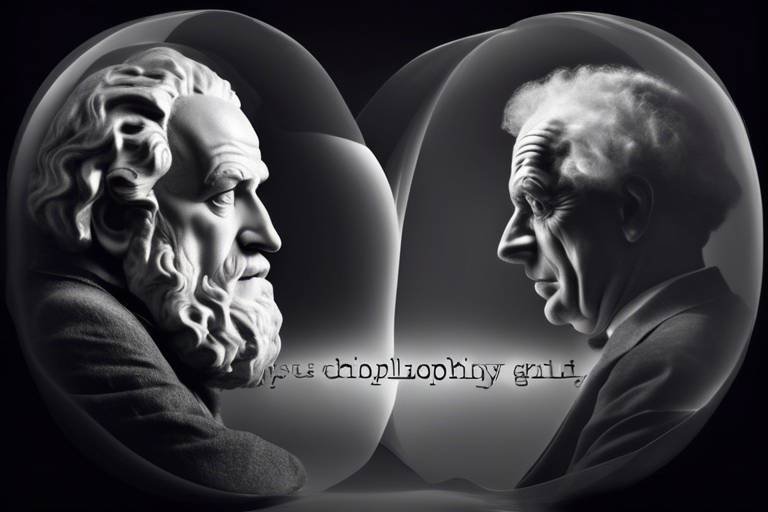Solipsism and Philosophy - Unpacking the Solitary Mind
Exploring the concept of solipsism is like diving into a deep, solitary ocean where the only certainty is the existence of your own thoughts. It's a philosophical idea that raises profound questions about the nature of reality, consciousness, and existence itself. Imagine standing in a room filled with people, yet feeling utterly alone because you can only be certain of your own mind. This is the essence of solipsism—a perspective that posits that only one’s own mind is sure to exist, leaving everything else as a mere shadow of perception. As we embark on this philosophical journey, we will unpack the implications of solipsism, its historical context, and the critiques it faces in contemporary discussions.
At its core, solipsism challenges our understanding of what is real. Originating from the Latin words "solus" (alone) and "ipse" (self), solipsism suggests that the only thing one can be certain of is their own mind and its experiences. Everything else—the external world, other people, and even the universe—could be mere illusions or constructs of one’s imagination. This radical notion raises significant philosophical questions: If I can only know my own thoughts, how can I be sure that anything outside of them exists? Furthermore, how does this perspective shape our understanding of perception and reality? Many philosophical thinkers have grappled with these questions, leading to a rich tapestry of discourse surrounding solipsism.
The roots of solipsism can be traced back to ancient philosophical traditions, where thinkers began to question the nature of existence and knowledge. Among the most influential figures who contributed to solipsistic thought are René Descartes and George Berkeley. Their ideas not only shaped the landscape of modern philosophy but also paved the way for contemporary interpretations of solipsism. Descartes famously declared, "Cogito, ergo sum" (I think, therefore I am), emphasizing the importance of individual thought as the foundation of existence. This assertion leads to a form of skepticism that aligns closely with solipsistic interpretations of reality.
René Descartes' philosophical approach is steeped in doubt and skepticism, which ultimately leads to solipsistic interpretations. His method of radical doubt involves questioning everything that can be doubted, leaving only the certainty of one's own existence as a thinking being. This journey through doubt unveils a striking realization: if all external experiences can be doubted, then the only undeniable truth is the existence of one's own mind. This notion raises a fundamental question: if I can doubt the existence of anything outside my own thoughts, does that mean I am the sole arbiter of reality?
In contrast, George Berkeley's philosophy introduces an intriguing twist to solipsistic thought. Berkeley posits that existence is intrinsically linked to perception—his famous dictum, "esse est percipi" (to be is to be perceived), suggests that objects only exist when they are perceived by a conscious mind. This idealism intersects with solipsism in fascinating ways, as it implies that reality is contingent upon individual consciousness. If reality only exists through perception, then how do we reconcile the existence of a shared world? Berkeley's ideas invite us to ponder whether our reality is a collective illusion or a solitary experience.
In contemporary philosophy, solipsism has not been left behind; rather, it has evolved through various interpretations and critiques. Modern thinkers have revisited solipsistic ideas, offering new insights that resonate with today’s understanding of consciousness and reality. For instance, advancements in cognitive science and psychology have shed light on the complexities of perception and the nature of the mind. These modern interpretations challenge the traditional solipsistic view, suggesting that while our perceptions may be subjective, they are also influenced by a broader reality that transcends individual consciousness.
One of the most significant implications of solipsism is its impact on the mind-body problem. If solipsism holds that only one’s mind is sure to exist, what does that mean for the relationship between mind and body? This section explores how solipsistic views influence discussions on consciousness, identity, and the nature of existence. The mind-body problem poses questions about whether the mind and body are separate entities or if they are intertwined in a complex relationship. Solipsism complicates this dialogue, as it implies that the body may be nothing more than a projection of the solitary mind.
Despite its intriguing premises, solipsism faces numerous critiques that challenge its validity. Critics argue that solipsism disregards the rich tapestry of human experience and the significance of social interaction. One of the main arguments against solipsism is its inability to account for the shared reality we experience with others. Can we truly believe that our relationships, emotions, and interactions are mere figments of our imagination? This question leads us to explore alternative philosophical perspectives that offer a more comprehensive understanding of reality.
One of the most compelling critiques of solipsism is its dismissal of social interaction. Relationships and shared experiences provide a counterargument to the notion of isolated consciousness. When we connect with others, we engage in a dialogue that transcends our individual minds, creating a shared reality that is rich and complex. The laughter of a friend, the warmth of a hug, or the shared silence of a moment all suggest that our experiences are not solely confined to our minds. This interconnectedness challenges the solipsistic claim that we are alone in our thoughts.
Various philosophical frameworks, such as realism and phenomenology, provide alternatives to solipsistic thinking. Realism posits that an objective reality exists independent of our perceptions, while phenomenology emphasizes the study of consciousness and the lived experience. These perspectives offer a more nuanced understanding of reality, suggesting that while our perceptions may be subjective, they are also grounded in a shared world that we collectively navigate.
- What is solipsism? Solipsism is the philosophical idea that only one's own mind is sure to exist, questioning the reality of everything outside of it.
- Who are the key figures associated with solipsism? Key figures include René Descartes and George Berkeley, who contributed significantly to the development of solipsistic thought.
- What are the main critiques of solipsism? Critiques include its disregard for social interaction and the richness of shared experiences that contradict the idea of isolated consciousness.
- How does solipsism relate to the mind-body problem? Solipsism complicates the mind-body problem by suggesting that if only one's mind is certain to exist, the body may merely be a projection of that mind.

Understanding Solipsism
Solipsism is a philosophical concept that posits that only one’s own mind is certain to exist. It raises profound questions about the nature of reality, consciousness, and existence itself. Imagine being the lone captain of a ship in an infinite ocean, where all you can see are the waves of your thoughts and experiences. This is the essence of solipsism—a solitary voyage through the mind, where everything outside of it becomes questionable.
The origins of solipsism can be traced back to the early philosophical inquiries into the nature of existence and knowledge. It challenges us to consider: if we can only know our own thoughts, how can we be sure of anything beyond them? This line of questioning leads us to ponder the reliability of our perceptions and the existence of an external world. In essence, solipsism is not merely a philosophical stance; it's a lens through which we can examine our understanding of reality.
Key proponents of solipsism include thinkers such as René Descartes and George Berkeley, who each contributed distinct perspectives that shaped the discourse around this concept. Descartes famously declared, "Cogito, ergo sum", which translates to "I think, therefore I am." This statement underscores the idea that the act of thinking is proof of one's existence, yet it also raises questions about the existence of anything beyond the self.
Berkeley, on the other hand, introduced the idea that existence is intrinsically linked to perception. His philosophy suggests that objects only exist as they are perceived, leading to a solipsistic interpretation of reality where the mind becomes the center of existence. This interplay between perception and reality invites us to ask: if a tree falls in a forest and no one is there to hear it, does it make a sound?
Solipsism, however, is not just an abstract concept; it has practical implications in our daily lives. It challenges us to reflect on how we engage with others and the world around us. Are we merely projecting our thoughts and feelings onto others, or is there a shared reality that connects us all? The philosophical inquiries surrounding solipsism compel us to explore the depths of our consciousness and the nature of our interactions.
In a world that often feels fragmented, solipsism serves as a reminder of the importance of connection and understanding. While it might seem tempting to retreat into the confines of our minds, the richness of human experience lies in our relationships and shared realities. Thus, solipsism, while a fascinating philosophical exploration, also invites us to find balance between the solitary mind and the collective human experience.

Historical Context
The roots of solipsism can be traced back to ancient philosophical traditions, where thinkers began to grapple with the nature of reality and perception. These early inquiries laid the groundwork for more profound explorations in later centuries. Among the most notable contributors to solipsistic thought are René Descartes and George Berkeley, whose ideas not only shaped the landscape of modern philosophy but also ignited debates that continue to resonate today.
Descartes, often heralded as the father of modern philosophy, introduced a radical form of skepticism that questioned the very foundations of knowledge. His famous statement, Cogito, ergo sum (I think, therefore I am), encapsulates the essence of solipsistic thought: the only certainty lies within one's own mind. This assertion leads to profound implications about the existence of the external world, as Descartes posits that everything outside of one's own consciousness could be an illusion. The implications of his skepticism force us to confront the uncomfortable reality that our perceptions might not reflect an objective truth.
In essence, Descartes' work invites us to consider the limits of human understanding. By systematically doubting everything from the existence of the physical world to the reliability of our senses, he creates a philosophical framework that seems to support solipsism. The more he questions, the more he isolates the mind as the sole arbiter of existence. This leads to a paradox: while Descartes seeks certainty, his method of doubt raises the unsettling possibility that we might be alone in our consciousness, surrounded by a world that could be merely a figment of our imagination.
Following in Descartes' footsteps, George Berkeley introduced a different perspective that intertwines with solipsistic ideas. Berkeley's philosophy posits that existence is fundamentally tied to perception—his famous dictum, Esse est percipi (To be is to be perceived), suggests that objects only exist insofar as they are perceived by a conscious mind. This raises the question: if a tree falls in a forest and no one is there to hear it, does it make a sound? Berkeley's idealism challenges the notion of an objective reality independent of our perceptions, echoing solipsistic themes while simultaneously offering a counterpoint to Descartes' skepticism.
As we move into the modern era, solipsism continues to be a topic of interest among philosophers. Contemporary thinkers have revisited the ideas of Descartes and Berkeley, offering new insights and critiques that reflect the complexities of today's philosophical landscape. For instance, some argue that advancements in neuroscience and psychology provide evidence against solipsistic claims by demonstrating the interconnectedness of human experience. Others point to the rise of digital technology and virtual realities, which complicate our understanding of consciousness and existence in ways that Descartes and Berkeley could never have anticipated.
In summary, the historical context of solipsism reveals a rich tapestry of philosophical inquiry that challenges our understanding of reality. From Descartes' radical skepticism to Berkeley's idealism, each thinker has contributed to a dialogue that continues to evolve. As we navigate the complexities of modern thought, the questions raised by solipsism remain as pertinent as ever, inviting us to reflect on the nature of our existence and the limits of our understanding.
- What is solipsism?
Solipsism is the philosophical idea that only one's mind is sure to exist, leading to questions about the reality of the external world.
- Who are the key philosophers associated with solipsism?
René Descartes and George Berkeley are two prominent figures whose ideas have significantly influenced solipsistic thought.
- How does solipsism relate to modern philosophy?
Modern philosophers have revisited solipsism, offering critiques and new insights that reflect contemporary understandings of consciousness and reality.
- What are the main critiques of solipsism?
Critiques of solipsism often focus on its disregard for social interaction and relationships, as well as alternative philosophical frameworks that provide a broader understanding of reality.

René Descartes and Doubt
Exploring the concept of solipsism, its implications in philosophy, and how it challenges our understanding of reality, consciousness, and existence. This article delves into the solitary nature of the mind and its philosophical significance.
Solipsism posits that only one's mind is sure to exist. This section will explore its origins, key proponents, and the philosophical questions it raises about reality and perception.
The roots of solipsism can be traced back to ancient philosophy. This section examines historical thinkers who have contributed to solipsistic thought, including Descartes and Berkeley, and how their ideas shaped modern philosophy.
René Descartes, often hailed as the father of modern philosophy, introduced a revolutionary way of thinking that fundamentally questioned the nature of existence. His famous dictum, Cogito, ergo sum, or "I think, therefore I am," encapsulates the essence of his philosophical inquiry. Descartes believed that the act of doubting one's existence serves as proof of the reality of one's own mind. In an age rife with uncertainty and skepticism, he sought to establish a firm foundation for knowledge, one that could withstand the test of doubt.
To understand Descartes' approach, it's essential to recognize the context in which he was writing. The 17th century was a tumultuous time, marked by scientific discoveries and philosophical shifts. Descartes, in his quest for certainty, employed a method of radical doubt. He proposed that if he could doubt something, then it must exist in some form. This led him to the conclusion that while he could doubt the existence of the physical world, he could not doubt the existence of his own thoughts. Thus, he laid the groundwork for a solipsistic interpretation of knowledge.
Descartes' skepticism invites us to ponder profound questions about reality and perception. It raises the following key points:
- Existence of the Self: The only undeniable truth is that the self exists as a thinking entity.
- Nature of Reality: If the external world can be doubted, what does that mean for our understanding of reality?
- Implications for Knowledge: How can we claim to know anything beyond our own thoughts?
Through his meditations, Descartes effectively dismantled the assumptions of his time, urging us to consider the reliability of our senses and the very fabric of reality. This introspective journey not only challenges our understanding of existence but also sets the stage for future philosophical debates surrounding solipsism. As we delve deeper into the nature of consciousness, we begin to see how Descartes' ideas resonate with contemporary discussions about the mind-body problem and the essence of reality itself.
George Berkeley's philosophy suggests that existence is tied to perception. This section analyzes how his idealism intersects with solipsistic ideas, questioning the nature of reality beyond individual consciousness.
Contemporary philosophers have revisited solipsism, offering new insights and critiques. This part discusses how modern thought has evolved from classical interpretations and its relevance in today's philosophical landscape.
Solipsism raises significant questions about the relationship between mind and body. This section examines how solipsistic views influence discussions on consciousness, identity, and the nature of existence.
Despite its intriguing premises, solipsism faces numerous critiques. This section outlines the main arguments against solipsism and explores alternative philosophical perspectives that challenge its validity.
One of the main critiques of solipsism is its disregard for social interaction. This subheading discusses how relationships and shared experiences contradict solipsistic claims about isolated consciousness.
Various philosophical frameworks, such as realism and phenomenology, offer alternatives to solipsistic thinking. This section explores these perspectives and how they provide a more comprehensive understanding of reality.
- What is solipsism? Solipsism is the philosophical idea that only one's mind is sure to exist, leading to questions about the nature of reality and perception.
- Who is René Descartes? Descartes was a 17th-century philosopher known for his work in skepticism and the foundation of modern philosophy, famously stating "I think, therefore I am."
- How does solipsism relate to modern philosophy? Modern philosophers have revisited solipsism, critiquing and evolving its ideas to address contemporary issues in consciousness and reality.

Cogito, ergo sum
Exploring the concept of solipsism, its implications in philosophy, and how it challenges our understanding of reality, consciousness, and existence. This article delves into the solitary nature of the mind and its philosophical significance.
Solipsism posits that only one's mind is sure to exist. This section will explore its origins, key proponents, and the philosophical questions it raises about reality and perception.
The roots of solipsism can be traced back to ancient philosophy. This section examines historical thinkers who have contributed to solipsistic thought, including Descartes and Berkeley, and how their ideas shaped modern philosophy.
René Descartes' famous dictum emphasizes individual thought as the basis of existence. This phrase, which translates to "I think, therefore I am," encapsulates the essence of Descartes' philosophical inquiry. In a world filled with uncertainty, Descartes sought to establish a foundation of knowledge that could withstand the test of doubt. Imagine standing on a shaky ground, questioning everything beneath your feet; the only solid ground you find is the act of thinking itself. Thus, he concluded that even if everything else could be an illusion, the very act of doubting or thinking confirms one's existence. This realization serves as a powerful starting point for philosophical exploration.
George Berkeley's philosophy suggests that existence is tied to perception. This section analyzes how his idealism intersects with solipsistic ideas, questioning the nature of reality beyond individual consciousness.
Contemporary philosophers have revisited solipsism, offering new insights and critiques. This part discusses how modern thought has evolved from classical interpretations and its relevance in today's philosophical landscape.
Solipsism raises significant questions about the relationship between mind and body. This section examines how solipsistic views influence discussions on consciousness, identity, and the nature of existence.
Despite its intriguing premises, solipsism faces numerous critiques. This section outlines the main arguments against solipsism and explores alternative philosophical perspectives that challenge its validity.
One of the main critiques of solipsism is its disregard for social interaction. This subheading discusses how relationships and shared experiences contradict solipsistic claims about isolated consciousness.
Various philosophical frameworks, such as realism and phenomenology, offer alternatives to solipsistic thinking. This section explores these perspectives and how they provide a more comprehensive understanding of reality.
- What is solipsism? Solipsism is the philosophical idea that only one's mind is sure to exist, raising questions about the nature of reality and perception.
- How does Descartes relate to solipsism? Descartes' famous phrase "Cogito, ergo sum" emphasizes that the act of thinking is proof of one's existence, which aligns with solipsistic thought.
- What are the critiques of solipsism? Critics argue that solipsism ignores social interactions and shared experiences, which challenge the notion of isolated consciousness.
- Are there alternatives to solipsism? Yes, philosophical frameworks such as realism and phenomenology provide different perspectives on existence and reality.

emphasizes individual thought as the basis of existence. This subheading discusses how his skepticism leads to solipsistic interpretations of knowledge and reality.
Exploring the concept of solipsism, its implications in philosophy, and how it challenges our understanding of reality, consciousness, and existence. This article delves into the solitary nature of the mind and its philosophical significance.
Solipsism posits that only one's mind is sure to exist. This section will explore its origins, key proponents, and the philosophical questions it raises about reality and perception.
The roots of solipsism can be traced back to ancient philosophy. This section examines historical thinkers who have contributed to solipsistic thought, including Descartes and Berkeley, and how their ideas shaped modern philosophy.
René Descartes' famous dictum Cogito, ergo sum emphasizes individual thought as the basis of existence. This assertion is not merely a philosophical statement; it is a profound declaration that encapsulates the essence of human consciousness. Descartes believed that the act of thinking is undeniable proof of one's existence. Imagine being in a dark room, unsure of your surroundings, yet as long as you can think, you can affirm, "I am here." This line of reasoning leads to a solipsistic interpretation of knowledge and reality, where the individual mind becomes the focal point of existence.
Descartes' skepticism plays a pivotal role in this philosophical framework. He questioned everything—his senses, the physical world, and even the existence of other minds. This radical doubt leads to a form of solipsism where the external world is uncertain, and the only certainty is the self. In this view, knowledge is confined to the perceptions and thoughts of the individual. The implications are staggering:
- Reality is subjective: What one perceives is all that can be known.
- Isolation of the mind: Each individual's experience is unique and disconnected from others.
- Challenge to shared knowledge: If only my mind exists, how can we trust shared truths?
This skepticism does not just challenge our understanding of reality; it invites us to question the very fabric of our existence. It paints a picture where the mind is both a fortress and a prison. While it empowers the individual to assert their existence, it simultaneously isolates them from the vast tapestry of shared human experience.
George Berkeley's philosophy suggests that existence is tied to perception. This section analyzes how his idealism intersects with solipsistic ideas, questioning the nature of reality beyond individual consciousness.
Contemporary philosophers have revisited solipsism, offering new insights and critiques. This part discusses how modern thought has evolved from classical interpretations and its relevance in today's philosophical landscape.
Solipsism raises significant questions about the relationship between mind and body. This section examines how solipsistic views influence discussions on consciousness, identity, and the nature of existence.
Despite its intriguing premises, solipsism faces numerous critiques. This section outlines the main arguments against solipsism and explores alternative philosophical perspectives that challenge its validity.
One of the main critiques of solipsism is its disregard for social interaction. This subheading discusses how relationships and shared experiences contradict solipsistic claims about isolated consciousness.
Various philosophical frameworks, such as realism and phenomenology, offer alternatives to solipsistic thinking. This section explores these perspectives and how they provide a more comprehensive understanding of reality.
- What is solipsism? Solipsism is the philosophical idea that only one's mind is sure to exist, leading to questions about the nature of reality and perception.
- Who is René Descartes? Descartes was a French philosopher known for his statement "Cogito, ergo sum," which means "I think, therefore I am," emphasizing individual thought as the basis of existence.
- How does solipsism relate to modern philosophy? Modern philosophy revisits solipsism, offering critiques and new interpretations that challenge its validity in understanding consciousness and reality.

Berkeley's Idealism
George Berkeley, an Irish philosopher of the early 18th century, introduced a radical perspective on existence that has captivated thinkers for centuries. His philosophy, often encapsulated in the phrase "esse est percipi" (to be is to be perceived), challenges the very fabric of our understanding of reality. Berkeley argued that material objects do not exist independently of our perception; instead, their existence is contingent upon being perceived by a conscious mind. This idea leads us down a fascinating path, where the boundaries of reality blur and consciousness takes center stage.
To grasp Berkeley's idealism, it's essential to consider how he viewed the relationship between perception and reality. He posited that all we can truly know are our perceptions—our thoughts, sensations, and experiences. This assertion raises profound questions: if objects exist only when perceived, what happens to them when we are not looking? Are they merely figments of our imagination, or do they continue to exist in some other form? Berkeley's philosophy invites us to explore the nature of existence itself, pushing us to reconsider our assumptions about the world around us.
One of the most intriguing implications of Berkeley's idealism is its intersection with solipsism. While solipsism suggests that only one's mind is sure to exist, Berkeley's view broadens the discussion by introducing the idea of a divine observer. According to Berkeley, God perceives everything, ensuring that objects continue to exist even when no human consciousness is aware of them. This divine perception acts as a stabilizing force in the chaotic landscape of individual consciousness, suggesting that reality is not entirely subjective but rather interconnected through a higher power.
Berkeley's ideas were not without their critics, and many philosophers have debated the validity of his claims. However, his work laid the groundwork for subsequent philosophical movements, particularly in the realm of idealism and phenomenology. His thoughts encourage us to question the reliability of our senses and the nature of reality itself, making us ponder whether we can ever truly know the world beyond our perceptions.
In modern times, Berkeley's idealism continues to resonate, especially in discussions about the nature of consciousness and reality. As we delve deeper into the realms of virtual reality and digital experiences, Berkeley's insights feel more relevant than ever. The line between perception and reality is increasingly blurred, prompting us to reflect on what it means to exist in a world where our experiences can be manipulated and altered.
Ultimately, Berkeley's idealism serves as a reminder of the profound interconnectedness of perception, consciousness, and reality. It challenges us to consider our place in the universe and the nature of existence itself, compelling us to engage in a deeper philosophical inquiry that transcends the mere acceptance of reality as it appears.

Modern Interpretations
In the realm of philosophy, solipsism has undergone a fascinating transformation as contemporary thinkers grapple with its implications in light of modern science and psychology. Today, solipsism isn't just a dusty old theory; it has sparked lively debates and fresh interpretations that challenge our understanding of consciousness and existence. So, what does modern philosophy have to say about this solitary mind?
One of the most intriguing aspects of modern interpretations of solipsism is how it intersects with advancements in neuroscience and cognitive psychology. Modern philosophers are increasingly exploring how our brains construct reality, suggesting that what we perceive is heavily influenced by our individual mental frameworks. This leads to a compelling question: if our minds shape our realities, to what extent can we trust the existence of an objective world outside our perceptions?
Some contemporary philosophers argue that while solipsism presents a compelling view on the nature of consciousness, it ultimately falls short when faced with the complexities of human experience. For instance, the phenomenon of shared experiences—like watching a movie with friends or attending a concert—raises doubts about the validity of solipsistic claims. How can we account for the rich tapestry of interactions that seem to exist independently of our individual minds? This is where the philosophy of inter-subjectivity comes into play, emphasizing that our realities are not solely personal but are also shaped by our connections with others.
Additionally, the rise of virtual reality (VR) technologies has provided a unique lens through which to examine solipsism. As we immerse ourselves in digital worlds that feel incredibly real, questions about the nature of existence become even more pronounced. Are we, in some ways, experiencing a modern form of solipsism when we engage with these environments? This interplay between technology and philosophy invites us to reconsider the boundaries of reality and consciousness.
Moreover, the existentialist movement has also influenced modern interpretations of solipsism. Thinkers like Jean-Paul Sartre and Martin Heidegger have emphasized the importance of existence preceding essence, suggesting that our identity is not solely defined by our thoughts but also by our actions and interactions in the world. This perspective challenges the solipsistic notion that the mind is the only certainty, advocating instead for a more integrated understanding of self that includes our relationships with others.
In summary, modern interpretations of solipsism are far from static. They are dynamic and evolving, reflecting the complexities of contemporary thought. As we continue to explore the intersection of consciousness, reality, and social interaction, the solitary mind may not be as isolated as it once seemed. Instead, it is a part of a larger, interconnected web of existence that invites us to question our assumptions about what it means to be truly aware.
- What is solipsism? Solipsism is the philosophical idea that only one's mind is sure to exist, leading to questions about the nature of reality and perception.
- Who are some key figures associated with solipsism? Notable philosophers include René Descartes, who emphasized doubt and individual thought, and George Berkeley, who linked existence to perception.
- How does modern technology influence solipsistic thought? Technologies like virtual reality challenge our understanding of reality, prompting questions about the nature of existence and our perceptions.
- What are some critiques of solipsism? Critics argue that solipsism neglects the importance of social interactions and shared experiences, which contradict the idea of isolated consciousness.

The Mind-Body Problem
The mind-body problem is a philosophical conundrum that has perplexed thinkers for centuries, and it finds a unique intersection with the concept of solipsism. At its core, this problem grapples with understanding how our mental states—thoughts, feelings, and consciousness—are related to our physical bodies. Think about it: how can something as intangible as a thought influence the tangible world around us? This question is not just academic; it touches on the very nature of existence and reality itself. In a solipsistic view, where only one's mind is assured to exist, the mind-body problem becomes even more pronounced, as it raises questions about the existence of anything beyond the self.
To unpack this further, let’s consider the implications of solipsism on our understanding of consciousness. If we accept that only our own mind is real, then the body becomes a mere vessel for that mind. This leads to a fascinating yet troubling conclusion: if our reality is confined to our perceptions, what does that say about the experiences of others? Are they merely figments of our imagination, or do they possess their own consciousness? This dilemma forces us to reflect on the nature of identity and existence.
Philosophers have approached the mind-body problem from various angles, often categorizing their views into two main camps: dualism and monism. Dualists, like René Descartes, argue that the mind and body are fundamentally different substances. In contrast, monists contend that everything is part of a single substance, whether that be physical or ideal. Solipsism tends to align more closely with a radical form of idealism, where the mind is the only certainty, and the body is secondary or even illusory. This perspective can lead to a rather lonely existence, where one's thoughts are the only reality, casting doubt on the shared experiences that form the basis of human connection.
Consider the implications of solipsism on our daily interactions. If we view others as mere projections of our consciousness, we might struggle to form genuine relationships. This solitary mindset can lead to feelings of isolation, as one grapples with the idea that no one else truly exists beyond their own mind. The mind-body problem, in this context, becomes a barrier to understanding not just ourselves, but also how we relate to others in the world.
In summary, the mind-body problem is a crucial aspect of solipsistic thought. It challenges us to consider the relationship between our subjective experiences and the external world. While solipsism offers a compelling lens through which to view reality, it also raises profound questions about the existence of others and the nature of consciousness itself. As we navigate these philosophical waters, we must confront the uncomfortable reality that our understanding of existence is deeply intertwined with the minds of those around us.
- What is solipsism? Solipsism is the philosophical idea that only one's own mind is sure to exist, leading to questions about the existence of the external world.
- How does solipsism relate to the mind-body problem? Solipsism emphasizes the solitary nature of the mind, complicating the relationship between mental states and physical existence.
- What are the main theories regarding the mind-body problem? The two primary theories are dualism, which posits that mind and body are separate, and monism, which argues they are one and the same.
- Can solipsism be reconciled with social interaction? Critics argue that solipsism undermines the reality of social interactions, as it suggests that others may not truly exist outside of one's own mind.

Critiques of Solipsism
Despite its intriguing premises, solipsism has come under fire from various philosophical angles. Critics argue that the idea of an isolated mind, existing independently of others, is not only implausible but also fundamentally flawed. One of the main critiques of solipsism lies in its inherent disregard for social interaction and the shared experiences that form the bedrock of human existence. Think about it: if only your mind truly exists, then how do you explain the rich tapestry of relationships, emotions, and interactions that color our lives? It's like trying to paint a masterpiece with only one color; it simply doesn't capture the full spectrum of human experience.
Another significant critique comes from the realm of empirical observation. Critics argue that solipsism fails to account for the observable world that seems to function independently of individual perception. If the universe were solely a figment of one’s imagination, why would it present itself with such consistency? For instance, you can drop a ball and watch it fall due to gravity, regardless of whether or not you are observing it. This consistency of physical laws suggests a reality that transcends individual consciousness.
Moreover, solipsism encounters challenges when it comes to the concept of knowledge. If we accept that only our minds exist, how can we trust the knowledge we acquire? This leads to a paradox where the very act of learning becomes questionable. If the external world is merely a projection of our thoughts, then how do we explain the vast amount of information that exists outside our personal experiences? The idea that knowledge can be universally shared and validated becomes problematic.
In examining these critiques, it’s essential to consider alternative philosophical perspectives that provide a more comprehensive understanding of reality. For instance, realism posits that a world exists independent of our perceptions, while phenomenology emphasizes the importance of experience and consciousness in shaping our understanding of reality. These frameworks challenge solipsistic claims by highlighting the interconnectedness of human experiences and the objective nature of the world.
To summarize, solipsism, while a fascinating concept, grapples with significant critiques that question its validity. The challenges posed by social interaction, empirical observation, and the nature of knowledge all serve to undermine the solipsistic viewpoint. As we delve deeper into the nature of existence and consciousness, we find that the richness of human experience cannot be reduced to a solitary mind. Instead, it is a vibrant interplay of thoughts, feelings, and interactions that shape our understanding of reality.
- What is solipsism? Solipsism is the philosophical idea that only one's mind is sure to exist, leading to questions about the nature of reality and perception.
- Who were the key philosophers associated with solipsism? Notable philosophers include René Descartes, who emphasized individual thought, and George Berkeley, who linked existence to perception.
- What are the main critiques of solipsism? Critics argue that solipsism ignores social interactions, fails to account for empirical observations, and raises questions about the validity of knowledge.
- What are some alternatives to solipsism? Philosophical frameworks like realism and phenomenology offer perspectives that emphasize the existence of an objective reality and the importance of shared human experiences.

Social Interaction and Reality
One of the most compelling critiques of solipsism lies in its apparent disregard for the rich tapestry of social interaction that defines human existence. Imagine living in a world where only your thoughts and perceptions matter—sounds lonely, right? The essence of being human is deeply intertwined with our connections to others. When we engage in conversations, share experiences, or even argue with friends, we are participating in a reality that transcends our individual minds. This reality is built on a foundation of shared experiences and mutual understanding, which solipsism struggles to accommodate.
To illustrate this point further, consider the following aspects of social interaction:
- Shared Experiences: Every time we attend a concert or a movie with friends, we create memories that are collectively experienced. These moments reinforce the idea that our realities are interconnected.
- Empathy and Understanding: The ability to empathize with others suggests that there is more to existence than our individual consciousness. When we feel joy for a friend's success or sorrow for their loss, we acknowledge a reality that includes more than just our thoughts.
- Communication: Language itself is a social construct. The fact that we can convey thoughts and feelings to others indicates a shared reality that solipsism cannot adequately explain.
Moreover, the idea of solipsism falters when we consider the unpredictability of human behavior. If reality were solely confined to our minds, we would be able to predict others' actions with absolute certainty. However, the world is filled with surprises—people often act in ways that are completely unexpected, challenging the notion that our consciousness is the only one that exists. This unpredictability adds a layer of complexity to our understanding of reality, suggesting that it is not merely a reflection of our individual perceptions but a shared experience that encompasses the thoughts and feelings of many.
In essence, social interaction serves as a powerful counterargument to solipsism. It reminds us that our experiences are not isolated; rather, they are part of a larger human experience. This interconnectedness enriches our lives and highlights the importance of engaging with others. So, the next time you find yourself lost in thought, remember the vibrant reality that exists beyond your mind—a reality filled with laughter, love, and the occasional debate!
- What is solipsism? Solipsism is the philosophical idea that only one's mind is sure to exist, leading to questions about the nature of reality and perception.
- How does social interaction challenge solipsism? Social interaction emphasizes shared experiences and connections with others, suggesting that reality is not confined to individual consciousness.
- Who are some key philosophers associated with solipsism? René Descartes and George Berkeley are notable figures whose ideas have contributed to discussions on solipsism.
- Are there alternatives to solipsistic thinking? Yes, philosophies like realism and phenomenology offer different perspectives on reality that challenge solipsistic views.

Philosophical Alternatives
In the vast ocean of philosophical thought, solipsism often feels like a solitary island, isolated and self-contained. However, there are several philosophical alternatives that challenge its premises and offer a more interconnected view of reality. One such alternative is **realism**, which asserts that a world exists independent of our perceptions. Realists argue that our sensory experiences, while subjective, do not negate the existence of an objective reality that we all share. This perspective is akin to standing on a busy street corner, aware that while your experience of the world is unique, the bustling life around you continues regardless of your individual perception.
Another significant alternative is **phenomenology**, pioneered by thinkers like Edmund Husserl and later expanded by Martin Heidegger. Phenomenology emphasizes the study of structures of consciousness as experienced from the first-person point of view. It invites us to explore how we experience the world rather than dismissing it as mere illusion. Imagine it as peeling an onion; each layer reveals more about our consciousness and our interactions with the world, suggesting that our experiences are deeply intertwined with the existence of others. Phenomenology thus provides a framework that acknowledges both individual perception and the shared nature of existence.
Additionally, **inter-subjectivity** plays a crucial role in countering solipsistic views. This concept highlights the importance of shared experiences and mutual understanding in shaping our realities. Our interactions with others create a tapestry of meaning that we cannot ignore. For instance, consider how emotions like joy or sorrow are amplified when shared with friends or loved ones. This inter-subjective experience reinforces the idea that our consciousness is not an isolated phenomenon but is instead a part of a larger network of human experience.
Moreover, the **dialogical philosophy** of Mikhail Bakhtin emphasizes the significance of dialogue in understanding reality. Bakhtin argues that meaning arises through the interaction of voices and perspectives, suggesting that our understanding of the world is enriched by the diversity of viewpoints. This approach challenges solipsism by asserting that knowledge and reality are co-created through communication and relationships, much like a vibrant conversation where each participant adds their unique insight.
In conclusion, while solipsism presents a captivating exploration of the solitary mind, philosophical alternatives like realism, phenomenology, inter-subjectivity, and dialogical philosophy provide robust frameworks that celebrate the interconnectedness of human experience. They remind us that our perceptions, while valid, are part of a larger narrative that includes the voices and realities of others. By embracing these alternatives, we can foster a more comprehensive understanding of existence that transcends the confines of individual consciousness.
- What is solipsism? Solipsism is the philosophical idea that only one's own mind is sure to exist, leading to questions about the nature of reality and perception.
- How does realism counter solipsism? Realism asserts that an objective reality exists independent of our perceptions, challenging the notion that only individual consciousness is real.
- What is phenomenology? Phenomenology is a philosophical approach that focuses on the structures of consciousness and how we experience the world from a first-person perspective.
- What role does inter-subjectivity play in philosophy? Inter-subjectivity emphasizes the shared experiences and mutual understanding that shape our realities, opposing the isolated view of solipsism.
- How does dialogical philosophy differ from solipsism? Dialogical philosophy highlights the importance of dialogue and diverse perspectives in creating meaning, suggesting that reality is co-constructed through interaction.
Frequently Asked Questions
- What is solipsism?
Solipsism is the philosophical idea that only one's own mind is sure to exist. It raises profound questions about the nature of reality, perception, and existence. Essentially, it suggests that everything outside of one's own consciousness is uncertain.
- Who are the key philosophers associated with solipsism?
Some notable philosophers who have engaged with solipsistic ideas include René Descartes, who famously stated "Cogito, ergo sum" (I think, therefore I am), and George Berkeley, who argued that existence is tied to perception. Their thoughts have significantly shaped the discourse around solipsism.
- How does solipsism relate to the mind-body problem?
Solipsism complicates the mind-body problem by questioning how our mind relates to the physical world. If only one's own mind is certain, it challenges our understanding of consciousness and identity, leading to deeper inquiries about existence itself.
- What are some critiques of solipsism?
Critics argue that solipsism overlooks the importance of social interaction and shared experiences. They believe that relationships with others provide evidence against the idea that only one's mind is real. Additionally, alternative philosophies like realism and phenomenology present more comprehensive views of reality.
- Can solipsism be reconciled with modern philosophy?
Yes, many contemporary philosophers have revisited solipsism, offering critiques and new interpretations. They explore how solipsistic thought can coexist with or challenge modern philosophical frameworks, highlighting its relevance in today's discussions about consciousness and reality.



















